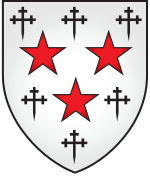Somerville College, Oxford
| Somerville College | |
|---|---|
 |
|
 |
|
| University | University of Oxford |
| Location | , Oxford |
| Coordinates | 51°45′35″N 1°15′43″W / 51.759644°N 1.261872°WCoordinates: 51°45′35″N 1°15′43″W / 51.759644°N 1.261872°W |
| Motto |
Donec rursus impleat orbem (translated: Until it should fill the world again) |
| Established | 1879 |
| Named for | Mary Somerville |
| Previous names | Somerville Hall (1879–1894) |
| Sister college | Girton College, Cambridge |
| Principal | Alice Prochaska |
| Undergraduates | 408 |
| Postgraduates | 163 |
| Website | www |
| Boat club | Boatclub |
| Map | |
Somerville College is one of the constituent colleges of the University of Oxford in England. Founded in 1879 as Somerville Hall, it was one of the first women's colleges in Oxford. Today, around 50% of students are male. The first male students were admitted to the college in 1994. The college is located at the southern end of , with Little Clarendon Street to the south and Walton Street to the west.
Between 2006 and 2016, the financial endowment rose from £44.5 million to £57.7 million.
In June 1878, the Association for the Higher Education of Women was formed, aiming for the eventual creation of a college for women in Oxford. Some of the more prominent members of the association were George Granville Bradley, Master of University College, T. H. Green, a prominent liberal philosopher and Fellow of Balliol College, and Edward Stuart Talbot, Warden of Keble College. Talbot insisted on a specifically Anglican institution, which was unacceptable to most of the other members. The two parties eventually split, and Talbot's group founded Lady Margaret Hall.
Thus, in 1879, a second committee was formed to create a college "in which no distinction will be made between students on the ground of their belonging to different religious denominations." This second committee included John Percival, George William Kitchin, A. H. D. Acland, Thomas Hill Green, Mary Ward, William Sidgwick, Henry Nettleship, and A. G. Vernon Harcourt.
...
Wikipedia

